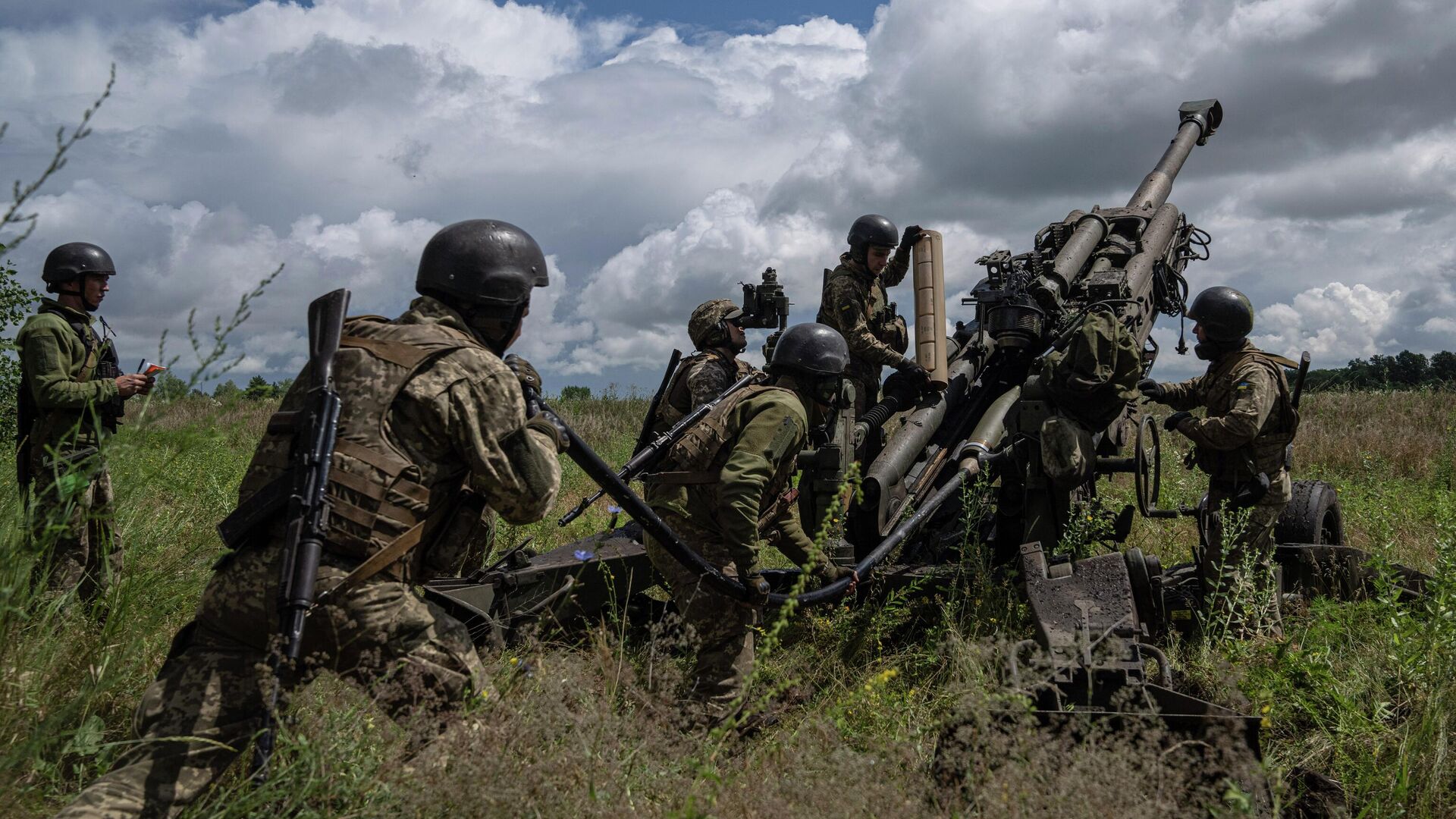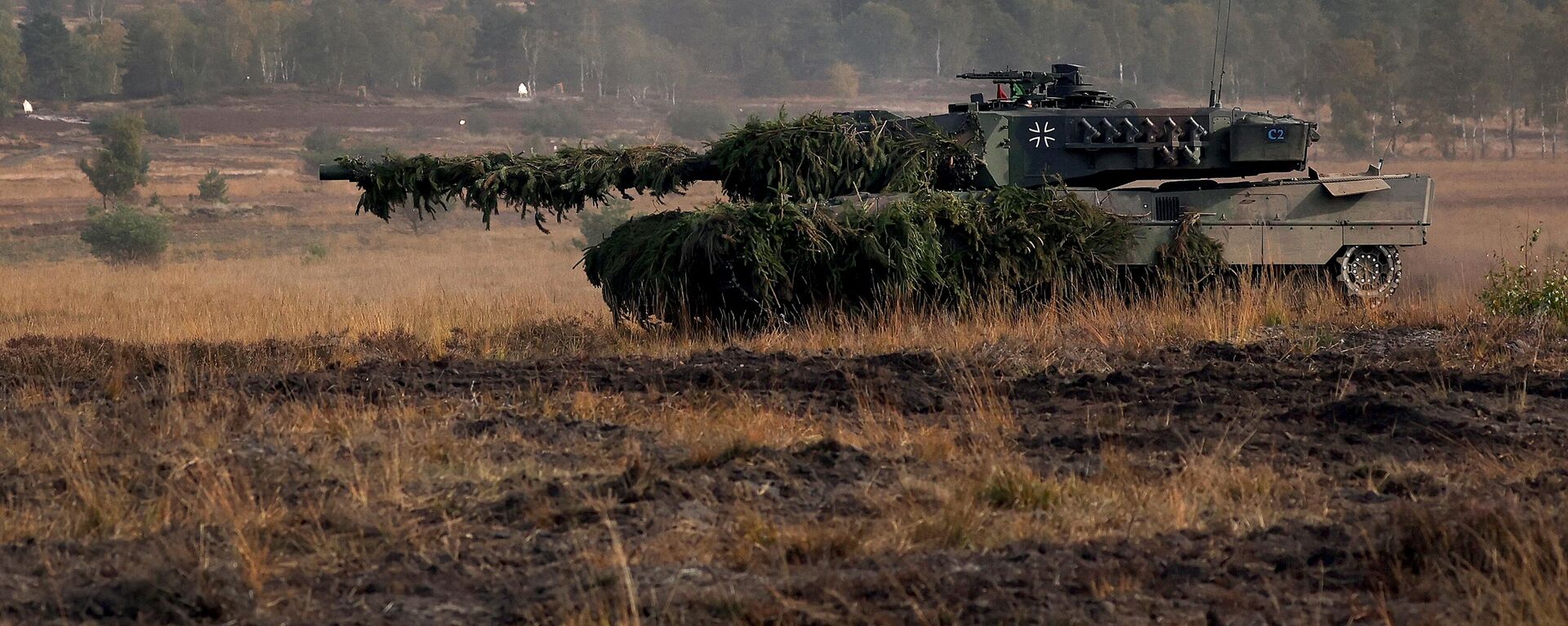US Benefits Most From the Ukraine Crisis, Says Russia’s Deputy Foreign Minister
04:15 GMT 30.01.2023 (Updated: 09:53 GMT 30.01.2023)

© AP Photo / Evgeniy Maloletka
Subscribe
MOSCOW (Sputnik) - Washington is largely benefiting from the Ukraine conflict, particularly from European countries’ weapon supplies to Kiev, Russian Deputy Foreign Minister Sergey Ryabkov told Sputnik.
"It is obvious that the United States is not only the main conductor in the Ukraine crisis, but also its main beneficiary. Among other things, Washington considers Ukraine as a testing ground for its military-industrial products, where various weapons systems and methods of their use, including modern, very long-range ones, are being tested… for resistance to Russian weapons," Ryabkov said.
He added that, by pulling military equipment out of Europe, sending it "for disposal" to Ukraine, Washington expects to impose on Europeans new, multibillion-dollar contracts for the purchase of US military products.
This "cynical game" "will end badly" for those involved, Ryabkov warned.
After Washington announced its decision to send Abrams tanks to Ukraine, Moscow does not see any way to hold talks with Kiev, Sergey Ryabkov said.
"We are ready to study any serious initiatives to resolve the Ukrainian crisis, but so far no one has really articulated them… In the current conditions, when Washington has announced its decision to supply tanks, and its vassals, including Ottawa, are competing to see who and how much weaponry will supply to Ukraine, especially outdated one, it is pointless to talk not only with the Ukronazis, but also with their puppeteers," Ryabkov said.
Kremlin spokesman Dmitry Peskov said on Thursday that arms supplies to Ukraine by Western countries testify to their direct and growing involvement in the conflict.
On Wednesday, US President Joe Biden announced that his country would send 31 M1 Abrams tanks to Ukraine. However, US officials said that the delivery of the tanks to Ukraine's battlefields and training would take many months, certainly not in time for Ukraine's alleged counteroffensive expected this spring.
Ryabkov told Sputnik that the decision to send Abrams battle tanks to Kiev was "an extremely destructive step" that has raised more concerns in the global community regarding US and NATO actions.
In April 2022, Moscow sent a note to NATO member states condemning their military assistance to Kiev. Russian Foreign Minister Sergey Lavrov warned that any arms shipments on Ukrainian territory would be "legitimate targets" for Russian forces.
Russia does not need anything from the West, but NATO is spreading "Russophobic horror stories" in the neighboring countries, Ryabkov said.
"We don't need anything from the West. We want to be left alone. But NATO, for its part, with maniacal persistence worthy of a better use, has consistently crawled up to the Russian borders, at the same time zombifying our neighboring countries with Russophobic horror stories," Ryabkov said.
He recalled that Russia had repeatedly warned NATO that there would be consequences for the alliance’s attempts to expand eastward.
"The Americans did not hear our warnings and did not take them seriously, but only continued in every possible way to incite Kiev against Russia," Ryabkov said, emphasizing that Russia will defend its legitimate security interests.
"The Americans did not hear our warnings and did not take them seriously, but only continued in every possible way to incite Kiev against Russia," Ryabkov said, emphasizing that Russia will defend its legitimate security interests.
In December, Russian Defense Minister Sergei Shoigu said that the emphasis in the activities of the operational and combat training of the Russian army in 2023 would be placed on the threats associated with the expansion of NATO to the East.
Moscow has always described NATO as an alliance aimed at confrontation. Kremlin spokesman Dmitry Peskov said in early April 2022, that the alliance's further expansion toward Russian borders was aggressive in nature and would not make Europe more secure.
Moscow has always described NATO as an alliance aimed at confrontation. Kremlin spokesman Dmitry Peskov said in early April 2022, that the alliance's further expansion toward Russian borders was aggressive in nature and would not make Europe more secure.
Moscow Chooses to Return to Discussion of Strategic Stability With Washington
Moscow is calculating the consequences of a possible dismantling of the arms control system, but chooses to return to discussions of strategic stability with Washington, Sergey Ryabkov said.
"We are ready for such a scenario. We are calculating it, including from the point of view of the consequences for how and in what context we will need to focus on guaranteeing our security. But we do not hide the fact that this is not our choice ... [we would like] to resume the process of discussing the topic of strategic stability and start working on a new security equation that would take into account all the factors influencing strategic stability," Ryabkov said.
The diplomat has said that Russia would deeply regret the collapse of the Strategic Arms Reduction Treaty (New START), but Moscow would not forcibly keep the United States in it. When asked if this means that Russia is already considering a scenario that there will be no arms control treaty after 2026 when the New START expires, he said that this is possible.
Russia Preparing for Consultations With United States on Bilateral Relations
Russia is preparing for a new round of consultations with the United States on bilateral relations and considers them useful, but there are no deadlines yet, Ryabkov said.
The Russia-US consultations regarding visa issues and operation of embassies were held in Istanbul last month. Commenting on their results, Ryabkov told Sputnik that the number of diplomatic missions' staff was not discussed. In general, the situation in this area is "quite confusing and has its own history," therefore, "dialogue on these subjects is important in principle," the diplomat said.
The Russia-US consultations regarding visa issues and operation of embassies were held in Istanbul last month. Commenting on their results, Ryabkov told Sputnik that the number of diplomatic missions' staff was not discussed. In general, the situation in this area is "quite confusing and has its own history," therefore, "dialogue on these subjects is important in principle," the diplomat said.
"As for the next round of Russian-US consultations, their date and place have not been determined to date. In general, we consider them useful for comparing positions. There is no other way to find common ground in order to somehow break the deadlock ... We are now engaged in routine preparatory work for the next meeting," Ryabkov said.
Moscow hopes that the tactics of small steps will eventually lead to mutually acceptable solutions on the most important issues on the bilateral agenda, he added.


